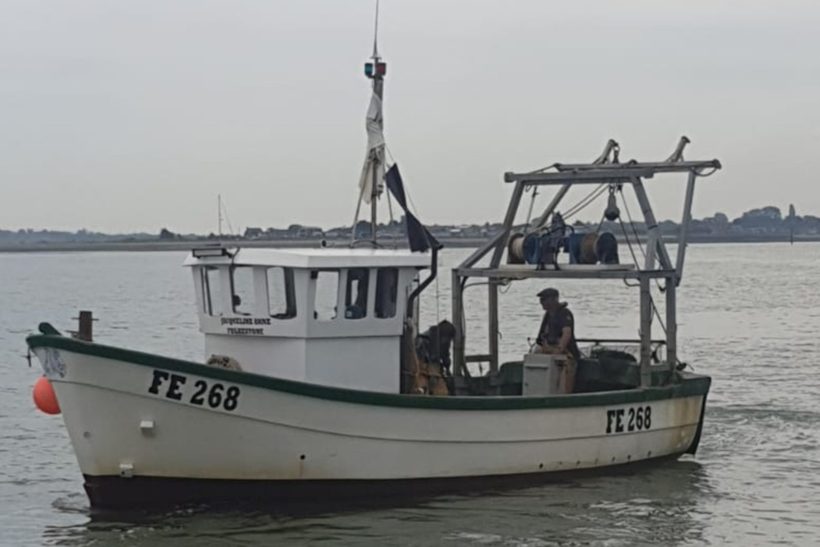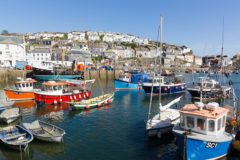Fishing News has been contacted by a wide range of small-boat skippers, across the UK, who are experiencing difficulties with getting their boats through the new MCA code, and the inspections required. Over the next few weeks, FN will strive to shed some light on the latest issue to threaten the UK’s inshore fleet
Very different vessels, but the same issues: two owners share their experiences
Bram Haward, Jacqueline Anne FE 268 (pictured above), West Mersea
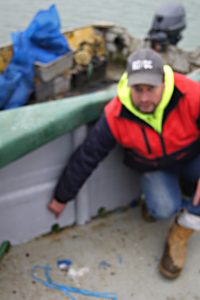
Bram indicates the height to which he could raise the deck in order to meet MCA code requirements. This runs the risk of increasing his vessel tonnage, but has already been refused as an option by the surveyor.
West Mersea oyster fisherman Bram Haward is the eighth generation of his family fishing from the port, operating an IP27 – but his vessel has been tied up through the height of the oyster season, as it is no longer certified by the MCA.
“Like all fishermen, we know we have to operate safely, and that some fishermen need protecting from themselves, through sensible safety regulations. We have all adopted new measures, such as wearing PFDs, as appetite to risk has changed, and we see the sense of them,” he told FN.
“Now though, things seem to have gone crazy. During my inspection, I was failed as my scuppers need to be raised by 70mm to meet the new specifications. The inspector made all sorts of impossible suggestions for the boat – moving my offset wheelhouse, for example, and reducing the amount of safety gear I carry in a waterproof locker under the deck.
“With help from a surveyor, I have offered several remedies, on a boat that has seen all types of seas, and has managed years of being beach-launched in Hastings, where the need to clear scuppers quickly during beaching operations is absolutely vital.
“I have been advised that I could possibly raise my deck by 30mm and then place in new scuppers, along with raising the covings, or fit a well deck, with three bilge pumps to clear the water.
“The first option would render my licence invalid, as the way the tonnage calculations for the boat are made, I will increase my tonnage above that allowed on my licence.

Bram (left) and Richard Haward, the eighth and seventh generations, respectively, of one of the UK’s longest-established shellfish businesses.
“The second option is, in my opinion, dangerous, putting water down into the hull that will be pumped out more slowly than can clear through the scuppers, and also require major work below deck.
“I couldn’t simply put in large deck drains as suggested. I will have to have these drain into brand new compartments below deck, basically, and install new pumps, to accommodate the engine and fuel tanks. Even then, it will be almost unworkable, even though the MCA is telling me I will somehow be safer.
“My boat has been tied up since the autumn, right through the oyster season. Luckily, our family company, Richard Haward’s Oysters, has been able to charter a vessel to get us through the season. But this, along with working with our own marine surveyor, and multiple meetings with the MCA, is all costing us money, whilst our most valuable asset sits idle, and risks being worth nothing.
“If this were about saving lives, or preventing accidents, we could possibly understand it, but as it stands, this seem to me to be about MCA surveyors trying to use a code designed for 15m boats, on small shellfish boats.
“We have no bones with the inspectors themselves, but they are working with a code that simply isn’t designed for use on vessels such as ours.”
Alex Kokoc, Weni CF 77, Porthcawl
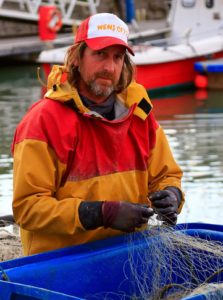
Welsh fisherman Alex Kokoc has been unable to fish since an MCA inspection in November 2021.
Welsh fisherman Alex Kokoc, who works a 6.9m Cheetah cat out of Porthcawl, has had similar issues, and has also had his vessel tied up since November, but without being able to charter a replacement.
“I have basically had no income since I was surveyed by the MCA, following an accident in November when I was pulled overboard – nothing whatsoever to do with the reasons my boat is now unable to go to sea. I fish single-handed, and I was very fortunate to survive.
“Although my boat was certified by the MCA 15 months earlier, a re-survey is standard procedure after a grounding event, such as occurred to me. The new code was applied to this extra survey, and like so many other boats in the same situation, the sealed deck is less than 200mm above the water level. Technically this means it is treated by the MCA as an open boat, with a well deck, and this changes how the whole boat now has to be drained.
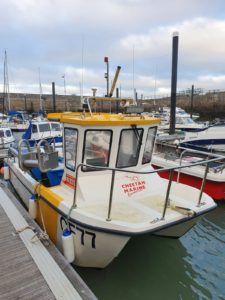
Alex Kokoc’s 6.9m Cheetah cat, similar in design to many around the UK and across Europe, was built to full Seafish standards and passed a previous MCA survey 15 months earlier without issue.
“Cheetah Marine, who built the boat, has been very helpful in trying to find a solution that will meet the requirements of the new survey, but we are finding it very hard. Every solution we look at, that seems to meet the requirements of the code, actually seems to make for a more dangerous boat.
“If I was to take a wave of water over the side of my vessel (as does happen in heavy weather), the proposed system of cutting sumps into my deck and relying on pumps – which are at risk of clogging with sand, seaweed, debris etc, and at risk of breakdown – leaves me reliant on my engine and battery power to operate the pumps, power I would likely lose in a situation of being swamped by water.
“Even with the pumps working, the water is going to take a significant time to be removed. I am then in a situation with a vessel full of trapped water, that would previously have flown out of the scuppers.
“The surveyor and local MCA technical manager have been sympathetic to my situation, and as helpful as they can in finding a solution, and I am in no way criticising them. The issue is the new code.
“Ironically, I have been asked to be part of a safety campaign regarding my accident by the MCA PR department. However, it is contradictory and dangerous to use my case to help promote safety going forward, when my vessel after these changes would in some weather now be seconds and one wave away from sinking.”
Do you have a similar story? We’re looking for inshore boat owners to tell us exactly what the MCA is asking you to do in order to be certified under the new code. Send examples and images to fishingnews.ed@kelsey.co.uk



